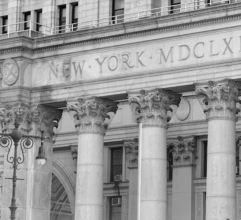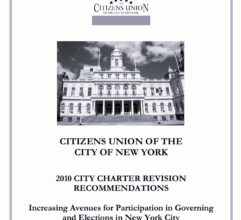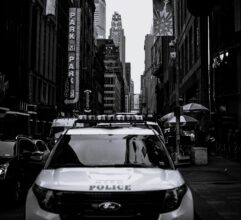Our Reform Agenda
- Provide the CCRB with prompt and full access to footage from body-worn cameras, police officers’ employment history and disciplinary records and all other documents and materials in the possession of the NYPD relevant to its investigations
- Update the NYPD’s information and data storage technology to allow police oversight agencies to access data relevant to their mission
- Merge the Office of the Inspector General for the NYPD and the Commission to Combat Police Corruption into the Civilian Complaint Review Board
- Expand the CCRB’s jurisdiction to include traffic and school safety agents and other civilian employees of the NYPD
- Transfer disciplinary hearings involving police officers from the NYPD to the Office of Administrative Trials and Hearings (OATH)
- In cases in which the Police Commissioner proposes to depart from a discipline recommendation of the CCRB involving suspension or termination, provide the CCRB with the right to appeal to a deputy mayor, who would have final authority over the penalty
- Make the appointment of the Police Commissioner subject to the advice and consent of the City Council
- Create a legal framework for policing, by establishing policies through publicly accessible law and regulation covering such areas as use of force, handling of demonstrations and the imposition of disciplinary sanctions
- Create a statewide authority to certify and decertify police officers
- Increase budget transparency by breaking down the NYPD budget into more specific units of appropriations
- Merge the three police oversight bodies into one police oversight board
- Maintain and expand pilot programs that effectively shift responsibilities from the NYPD to other city agencies in areas like mental health, homelessness outreach, and schools and youth
- Invest in alternative models for community-driven public safety, such as the Mayor’s Action Plan and Cure Violence programs, currently run by The Mayor’s Office of Criminal Justice
- Provide local community stakeholders a decision-making role in developing and improving public safety plans
- Provide the CCRB with prompt and full access to footage from body-worn cameras, police officers’ employment history and disciplinary records and all other documents and materials in the possession of the NYPD relevant to its investigations
- Update the NYPD’s information and data storage technology to allow police oversight agencies to access data relevant to their mission
- Merge the Office of the Inspector General for the NYPD and the Commission to Combat Police Corruption into the Civilian Complaint Review Board
- Expand the CCRB’s jurisdiction to include traffic and school safety agents and other civilian employees of the NYPD
- Transfer disciplinary hearings involving police officers from the NYPD to the Office of Administrative Trials and Hearings (OATH)
- In cases in which the Police Commissioner proposes to depart from a discipline recommendation of the CCRB involving suspension or termination, provide the CCRB with the right to appeal to a deputy mayor, who would have final authority over the penalty
- Make the appointment of the Police Commissioner subject to the advice and consent of the City Council
- Create a legal framework for policing, by establishing policies through publicly accessible law and regulation covering such areas as use of force, handling of demonstrations and the imposition of disciplinary sanctions
- Create a statewide authority to certify and decertify police officers
- Increase budget transparency by breaking down the NYPD budget into more specific units of appropriations
- Merge the three police oversight bodies into one police oversight board
- Maintain and expand pilot programs that effectively shift responsibilities from the NYPD to other city agencies in areas like mental health, homelessness outreach, and schools and youth
- Invest in alternative models for community-driven public safety, such as the Mayor’s Action Plan and Cure Violence programs, currently run by The Mayor’s Office of Criminal Justice
- Provide local community stakeholders a decision-making role in developing and improving public safety plans
Highlights:
From the Archives:

1987
CU helps defeat weak ethics bill and backs a stronger Conflict of Interest Board.

2010
Seminal report on needed NYC Charter revisions to increase public participation

2012
CU’s advocacy shifts police misconduct prosecutions to the Civilian Complaint Review Board in NYC
